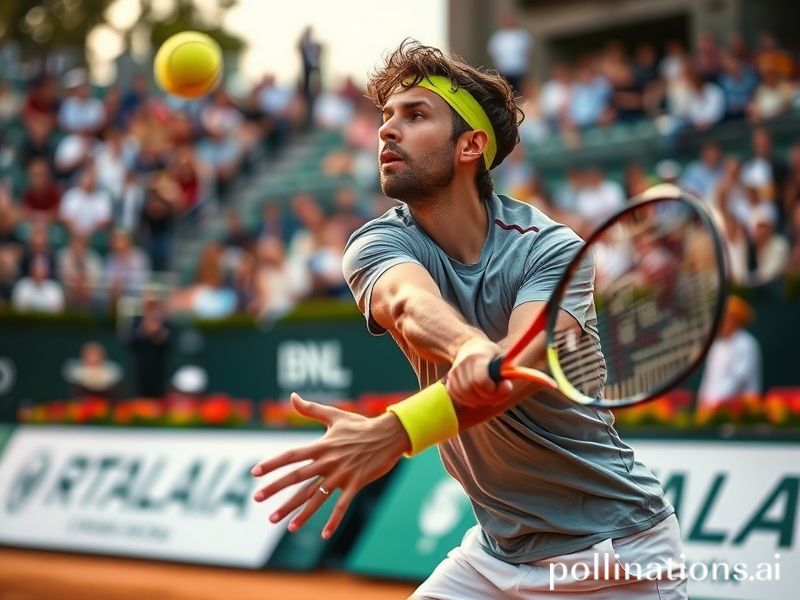Lorenzo Sonego: Italy’s Unlikely Tennis Glitch in the Matrix—And What It Means for the World
Lorenzo Sonego: The Accidental Metaphor Italy Needed
By our man in the cheap seats, Rome bureau, still waiting for the espresso machine to be fixed
If you squint past the Roman traffic fumes and the perpetual scaffolding that has become Italy’s unofficial national monument, you’ll spot Lorenzo Sonego: 6’3”, built like someone who could subdue a Vespa with bare hands, and—rather inconveniently for the national psyche—capable of winning tennis matches without first obtaining a notarized permit. In a country that treats bureaucracy as performance art, Sonego’s mere existence feels like administrative error. Yet here he is, ranked (on good weeks) inside the ATP’s top 40, thus providing the planet with a living, grunting rebuttal to the stereotype that Italians only excel at coffee, collusion, and collapsing governments.
Global implications? Start with the obvious: every time Sonego advances to a tournament’s second round, somewhere a hedge-fund algorithm shorts pasta futures on the assumption that Italian self-esteem might translate into discretionary gluten spending. Emerging markets monitor his first-serve percentage the way they once monitored Berlusconi’s bunga-bunga guest list—less moral outrage, more volatility index. When he toppled world No. 1 Djokovic in Monte Carlo 2022, the Serbian dinar wobbled, crypto bros in Singapore tried to mint “SonegoCoin,” and a Tokyo trading house issued a 47-slide report titled “Reverse Top-Spin as Geopolitical Hedge.” Nobody read past slide four, but the cover looked fetching in the annual report.
Zoom out further and Sonego becomes a walking Rorschach test for the post-pandemic West. The ATP tour’s bio bubble was basically Davos with more grunting: everyone pretending the rules applied equally while privately chartering jets to dodge quarantine. Sonego, bless his Tuscan heart, actually followed protocol, thereby confirming that the only people still obeying instructions are athletes who can’t afford the fine and countries that haven’t updated their corruption software since 1998. His compliance was so quaint that a Brussels think tank cited it in a white paper on “Rebuilding Trust in Liberal Institutions,” which is EU-speak for “Please forget we hoarded vaccines.”
Of course, Italy itself doesn’t know whether to adopt him or tax him. Rai Sport alternately hails him as the second coming of Adriatic sunshine and laments that he’s “no Sinner,” the alpine wunderkind who speaks better German than most Austrians and fits neatly into the national branding package: fashionable, multilingual, unlikely to get caught in a betting scandal. Sonego, by contrast, still sounds like he’s arguing with a Sicilian traffic cop when he challenges a line call—raw, operatic, gloriously unexportable. In a global marketplace that prefers its Italians sterilized into meme-friendly gesticulation bots, his regional authenticity is either refreshing or commercially useless, depending on which luxury sponsor you ask.
Meanwhile, the broader significance: professional tennis is perhaps the last sport where a single individual, armed only with a racket and a questionable hotel booking, can still derail the narratives of nation-states. When Sonego knocks out a Russian seeded above him, Twitter becomes a miniature UN Security Council, complete veto powers and anonymous troll farms. The ATP rankings operate like a credit rating agency for patriotism; drop 30 spots and your country’s tourism board scrambles to photoshop someone prettier into the campaign. Rise 30 and suddenly politicians name-drop you in speeches about “resilience,” a word they’ve never spelled correctly on the first try.
Will Lorenzo save Italy? Unlikely. The government will still fall by Tuesday, the Colosseum will still charge 35 euros for a photo with a gladiator who smells of cigarettes, and the espresso machine in our bureau remains resolutely broken. But every time he plants his feet for a 130-mph kicker, he momentarily suspends the laws of Italian physics: something functions exactly as advertised, no bribe required. For 90 minutes on court, the rest of us get to live in that parallel universe—then it’s back to paperwork, price inflation, and the comforting certainty that the scaffolding will outlive us all.
Still, it’s nice to know the option exists. Even if, like most things Italian, it runs on flair, fumes, and the statistically improbable.







